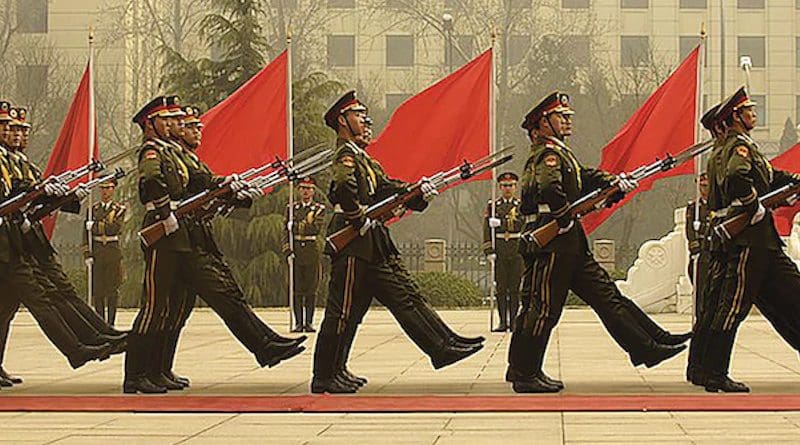What Lies Between China’s Nationalism And Growth? – Analysis
By Zeying Wu and Richard Yarrow
At the 2008 Beijing Olympics, China appeared with national pride and confidence and declared its claim for greater global status. China has shed a low profile in international relations, expressing a desire to compete with the world’s leading nations. China’s competitive motivation, in areas from trade to maritime disputes, reflects a spreading national consciousness among many Chinese citizens.
Western commentators often depict Chinese nationalism and patriotic pride as harmful for China — a propaganda-derived burden which sows inter-ethnic conflict, protectionism against foreign businesses and tension with neighbouring countries. Many observers reduce Chinese national identity to nationalism’s negative connotations in the West — of racial or cultural arrogance, productivity-destroying protectionism, despotic politics and aggressive expansionism.
These interpretations can be true to some extent for nationalism in any country but are one-sided and view Chinese nationalism and identity narrowly and without context. Chinese nationalism resembles the basic spirit of ‘national’ or ‘patriotic’ pride in other countries and extends from aspirations to win China prestige in a world of nation-states. Nationalism does not definitively harm China’s growth or global standing, and in some ways has helped both.
Nationalism ties individuals’ personal dignity to their national identity, encouraging ‘nationals’ to search for higher prestige for their nation in comparison or competition with other nations. It came to signify a belief in the fundamental equality of members of a national community, sovereignty residing in the national populace and a secular view of a world composed of different peoples. In China, nationalism spread after the Sino-Japanese War of 1894–95 among intellectual, political and economic elites.
Yet efforts to broadly instil national consciousness across China had little success. In 1944, despite years of Nationalist Party rule, Henan villagers disarmed some 50,000 Chinese soldiers during a retreat from Japanese forces. Former Chinese leader Deng Xiaoping famously overestimated how many overseas students would return to China early in the post-Mao era — very few did. As writers like Lu Xun, Mao Dun or Zhang Ailing depicted, many Chinese people well into the 20th century lived with traditional ethics and social structures long predating China’s nationalist revolutions. Many remained indifferent to values of membership in a national community and sovereignty based on a populace of equal ‘nationals’.
This situation changed dramatically with Deng’s ‘reform and opening’. The government made economic activity a condition or guarantor for one’s welfare and involved the public in ‘building a rich country’. Citizens gained opportunities to elevate their social status through economic activities. They could see their entrepreneurial work leading clearly to their own and their society’s wellbeing, inspiring pride in the society to which they contributed. They gained a framework to justify profit-seeking and personal pursuits — previously discouraged by traditional and Maoist ethics — through benefits to the nation. As economic activities became a greater part of individual and societal pride, business success could bestow a sense of heroism, with social honours for improving the nation alongside personal riches.
Though government promoted people’s sense of national identity, market-oriented developments helped spread the sense of a stake in the nation regardless of propaganda. As China accumulated economic successes, more Chinese — especially in cities and coastal areas — could feel pride in China’s growth and a connection between their own status and achievements and their nation’s rising prestige. This connection helped motivate many individuals’ commitment for China to compete globally.
Nationalism helped propel new industries. As HNA Group’s Chen Feng declared, ‘we need a batch of world-class companies to emerge from China to help the country’s growth’. Similar sentiments contributed to China’s technology sector, which has become key to China’s sense of being a strong nation. Firms like Huawei rallied consumers, employees and government supporters by pledging to make ‘Made in China’ a symbol of industrial might and reliable quality. This was often done with an explicit focus on ‘national interest’ and implication that business growth should enhance national power.
During their countries’ economic renaissance, a number of Japanese and South Korean writers demanded greater national autonomy and assertion, such as a ‘Japan that can say no’. They saw businesses generate national glory which further motivated development. Chinese leaders have noted this phenomenon. Thirty years ago, now politburo member Wang Huning wrote about Japanese companies’ desire to ‘build the nation’ and win Japan international prominence: ‘Motivated by this political goal, Japanese enterprises … expanded investment, enhanced competitiveness, and penetrated the world market’. Chinese leaders may behave differently with newfound riches than Japanese or South Korean leaders did, not least given China’s size and single-party system. But Chinese individuals’ basic motives and sentiments — and their implications for China’s growth — should be recognisable to people elsewhere.
It remains to be seen how China’s national identity and search for prestige will adjust in the future. China might express a Confucian-inspired identity that can win international admirers and provide a basis for China’s greater global role, a vision some Chinese and Western intellectuals propose. Alternatively, nationalism might become a stronger driver of China’s growth while deepening tensions with other countries. To understand its effects, observers must not simply dismiss China’s nationalism, but approach both its inherent risks and the rationales, sentiments and enthusiasm of ordinary individuals.
*About the authors:
- Richard Yarrow is a Fellow in the Mossavar-Rahmani Center for Business and Government at the John F Kennedy School of Government, Harvard University.
- Zeying Wu is a PhD candidate in Political Science at Boston University.
Source: This article was published by East Asia Forum

